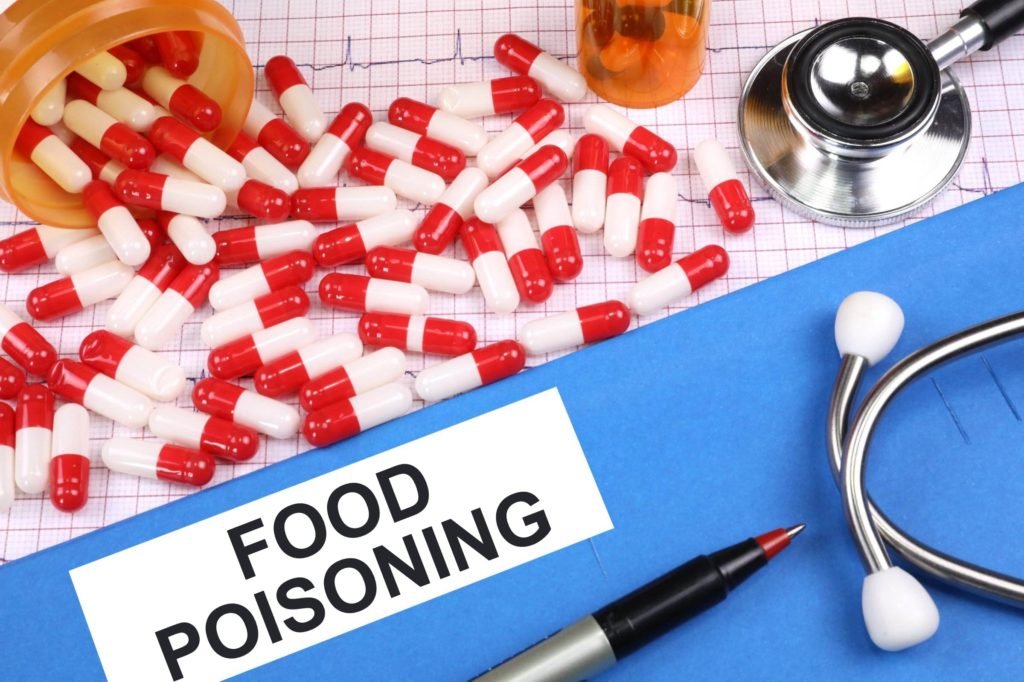The term “food poisoning” consists of two words: “food” and “poison.” We know how much food is essential for your health and body growth, so how can it be poisonous?
Well, we will not try to intake something that may harm our bodies, but still, your food can be spoiled by several microorganisms that grow on our foods and sometimes produce toxic substances that can lead to small stomachaches or even death.
In this blog, we will try to cover the whole concept of food poisoning and try to answer your questions related to it, such as what exactly is food poisoning? How is it caused? Is food poisoning contagious, and how can it be treated? What is the actual difference between food poisoning and stomach flu?

What Do You Understand By “Food Poisoning”?
Food poisoning is a usual and potentially serious condition that occurs when you eat food or drink beverages contaminated with bacteria, viruses, molds, toxic substances, or parasites. They usually range from the well-known E. coli and Salmonella to the other less-known bacteria such as Campylobacter, Toxoplasma, Listeria, and Clostridium Perfringens. Most foodborne illnesses go away after time and do not have lasting effects, but some, such as E. coli 0157:H7, are so harmful that they can even cause kidney failure and death if not treated properly.
Food poisoning can cause nausea, vomiting, diarrhea (loose stools), abdominal cramps, and fever. You may also have chills, headaches, muscle aches, and fatigue. Most people recover from food poisoning in about 3 to 5 days without treatment. However, the symptoms can last longer than this time frame if your illness is severe enough to require hospitalization.
The medical community has another term for food poisoning: foodborne illness. You are not poisoned by food but instead infected by something that lives on it.
One question that often confuses people is: is food poisoning contagious?
You need to understand that the intake of spoilt food causes this disease, and it cannot be transmitted to another person. Although if you know someone affected by it, you should maintain a distance from them. But do not worry. The case is not so critical that you need to isolate them.
Chipotle Food Poisoning 2021 Outbreak

Some of the more well-known food safety issues in recent memory are the outbreaks of foodborne disease at Chipotle. The largest-ever fine in a food safety lawsuit was reached by Chipotle Mexican Grill, who agreed to pay a $25 million fine. In order to resolve criminal accusations stemming from the role played by Chipotle Mexican Grill Restaurants in a string of food safety incidents between 2015 and 2018, which led to the illness of over 1,100 people, Chipotle will pay this sum.
For a multinational corporation that recently generated $2 billion in revenue in FY 2021, this $25 million food safety fine may not seem like a significant sum. But it makes a significant point about abiding by food safety regulations. The harsh punishment imposed today will serve as a reminder to others in the business to assess and enhance their own health and safety procedures, according to U.S. Attorney Nick Hanna for the Central District of California. To address the charges related to the foodborne disease outbreak and to create and adhere to an upgraded and comprehensive food safety compliance program, Chipotle Mexican Grill has also consented to pay a fine and enter into a three-year Deferred Prosecution Agreement. Trusted Source
How Does Food Get Poisoned?
Food poisoning comes from food that is mishandled or not cooked properly. There can be multiple reasons for it. Maybe it was left for too long under the heat, not appropriately refrigerated, or handled by someone who did not clean their hands and did not maintain hygiene in the place.
Some foodborne illnesses can strike days or even weeks after exposure because it takes a long time for the pathogen to replicate inside your body and strike. This is known as the incubation period.
Do you know that there is one another term for food poisoning? It is Gastrointestinal disorder.
Also Read: 10 Powerful Home Remedies for Heartburn and Acid Reflux
The Major Difference Between Food Poisoning and Stomach Flu
Food poisoning is an illness caused by eating contaminated food. Bacteria, viruses, or parasites can cause it. Visible and main symptoms of food poisoning include nausea, vomiting, and diarrhea. “Stomach flu” is a viral infection that causes symptoms similar to the common cold. The main difference between these two diseases is that stomach flu usually lasts for a shorter period than food poisoning does.
Some cases of food poisoning or foodborne illness are misdiagnosed as stomach flu because people cannot recall what they ate previously, which is now causing harm.
Food poisoning arguably comes faster than stomach flu; it is immediate and sudden. Whereas a stomach bug or gastritis is gradually working through you, it will take a little while to cause them harm.
How Much Does Food Poisoning Affect Your Body?
Most of the time, in typical food poisoning cases, people recover on their own after a few days if their immunity system is robust and the virus affecting their health is not so dangerous. One of the most severe complications of food poisoning is dehydration. Your body starts to lose water, and you feel exhausted, which can be critical for those very young or very old. Food poisoning can cause stomach cramps, vomiting, and diarrhea. It can also make you feel feverish, weak, and dizzy. Food poisoning may last for a few days or up to 3 weeks. If it lasts longer than that, you must consult your doctor.
Also Read: 7 Easy Ways To Increase Testosterone Levels Naturally
What Are The Symptoms?
Here is the list of symptoms you need to look after to identify that one is suffering from severe food poisoning:
High Fever: A high fever is characterized by an extremely high body temperature of more than 101.5° F. It can be caused by many different things, but the most common cause of high fever is an infection caused by food poisoning. You may have a mild case of the flu or a disease, but either way, your temperature will be higher than usual. The reason is the bacterial infection that attacks your immunity system.
Bloody Diarrhea: A bacterial infection is the most common cause of bloody diarrhea.
This occurs when bacteria invade the digestive tract and multiply in the large intestine. The bacteria then produce toxins that damage the intestinal lining, causing inflammation and bleeding. Other causes include parasites, viruses, and other infections that damage or inflame the intestinal wall.
Some people experience bloody diarrhea for no apparent reason at all. It can signify underlying diseases, such as celiac disease or inflammatory bowel disease (IBD). Some medications can also cause it, including antibiotics and antidiarrheal medicines.
Frequent Vomiting: Frequent vomiting in food poisoning is a severe form of vomiting that occurs several times within 24 hours. This type of vomiting is usually caused by ingesting an unusually large amount of food or by some other unusual factor, such as stress or anxiety. The vomit may be greenish-yellow and frothy, indicating that many undigested particles are present in the stomach. Frequent vomiting in food poisoning can also occur with nausea and abdominal pain (visceral), but these symptoms typically do not last for more than a few hours after eating.
Dehydration: Dehydration is the most common symptom of food poisoning. It occurs when the body experiences too much water loss. This can happen because of vomiting or diarrhea, both of which cause you to lose more fluid than usual. Dehydration can also happen if you take certain medications, such as diuretics (water pills), and have no way to replace the fluids lost through vomiting or diarrhea.
What Can You Do to Prevent Food Poisoning?
Food poisoning indicates that your health mechanism is not working correctly, which is caused by some of your bad eating habits. The ideal way to avoid food poisoning is to eat only foods that have been cooked thoroughly. Also, ensure you wash your hands thoroughly before and after handling raw meat, poultry, and fish. And if you don’t have time for a thorough wash, at least wash your hands with soap and water when preparing raw meat or poultry products.
And finally, it’s essential to keep an eye on what you eat as well as how long it takes for the food stuff to be prepared to prevent food poisoning.
But still, if you are suffering from it, there are several ways you can regulate this effect by taking the necessary steps:
First Thing to Do: If you get sick from contaminated food, drink lots of fluids, so your body has enough liquid to fight off the infection. Avoid caffeine intake and alcohol for at least 24 hours after getting sick because they can worsen symptoms by causing dehydration and nausea.
Foods To Avoid: You should follow a bland diet when suffering from food poisoning. That means the food should not be too spicy but soft. Shellfish, eggs, fish, and dairy products (milk, cheese) that were not correctly handled before being sold to customers should be avoided. This will include unpasteurized milk and soft cheeses such as camembert or brie, which may contain Listeria monocytogenes bacteria. After handling raw meat and poultry, food handlers should wash their hands with soap. They should also be careful when touching raw fruits and vegetables because they can transfer harmful microorganisms from one item to another.
You can try some home remedies for mild food poisoning symptoms, such as eating particular foods.
Banana: Eating bananas can help you deal with nausea and vomiting. Bananas help deal with any issues related to your digestive system.
Mash Potatoes: This is because mashed potatoes are soft and help prevent running. Mash potatoes to make sure that the situation does not get worse.
Rice water: When you suffer from food poisoning, you must guard yourself against dehydration. Rice water is the best way to keep yourself hydrated. It helps restore the fluid in your body that has been expelled from your body through vomiting.
Oranges: Oranges can act as a quick fix. You should eat a few slices of oranges, not too much, right after you feel something is wrong with your stomach.
Cinnamon is especially effective in providing relief from nausea. It also helps fight against E.Coli bacteria and provides comfort in the short term.
When to see a doctor?
You must visit your doctor or health care provider if you have severe symptoms, including blood stools, high fever (temperature over 38.9°C/102°F), frequent vomiting that prevents liquid that leads to dehydration, parched mouth, and throat, or feeling dizzy whenever you try to stand up.
Conclusion: Sometimes, a simple medical condition can seriously harm your health. Food poison can possibly be the reason for it. So you need to know about it. Please share this blog with people who need it. Thank you for reading.





